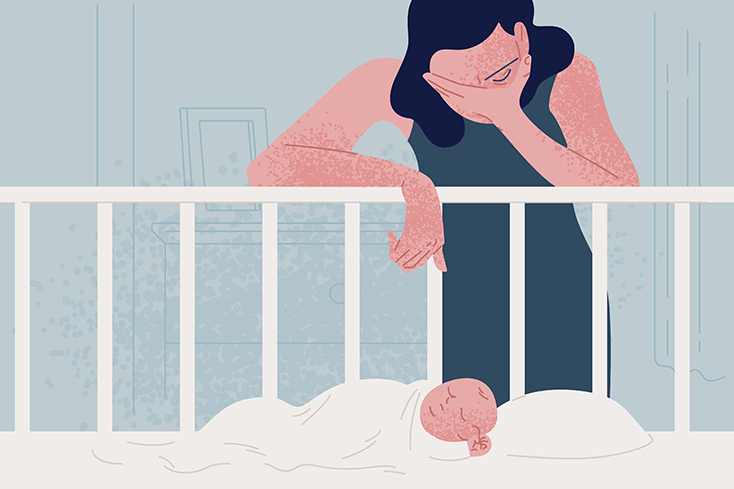If you are a new parent, there is a good chance that you have heard of post-partum depression. However, did you know that there is another condition that can affect parents after giving birth? This condition is called perinatal OCD, and it can be just as debilitating as post-partum depression. In this blog post, we will discuss the symptoms of perinatal OCD and how to get help if you think that you may be suffering from it.
Contents
What Is Perinatal OCD?

Perinatal OCD is a form of Obsessive-Compulsive Disorder (OCD) that can occur during pregnancy or in the first year after giving birth. Like other forms of OCD, perinatal OCD is characterized by intrusive thoughts and repetitive behaviors. However, the focus of these thoughts and behaviors is typically on the health and well-being of the baby. For example, a parent with perinatal OCD may have obsessive fears about harming their child or may develop compulsive rituals around protecting their child from harm.
Causes Of Perinatal OCD
There is no one cause of perinatal OCD. Rather, it is thought to be the result of a combination of factors, including hormonal changes, sleep deprivation, and stress. Additionally, perinatal OCD has been linked to a history of mental illness in the family. If you have a parent or sibling who suffers from OCD, you may be more likely to develop the condition yourself.
Furthermore, any traumatic encounters such as abortion, miscarriage, or death of a baby due to medical reasons can also be a prominent cause of developing this obsessive fear.
Symptoms Of Perinatal OCD
The symptoms of perinatal OCD can vary from mild to severe. Some parents with perinatal OCD may only have occasional intrusive thoughts, while others may be plagued by constant obsessions. Likewise, some parents may only engage in very mild compulsions (e.g., washing their hands after touching their baby), while others may have more severe rituals (e.g., not leaving the house for fear of something happening to the baby).
The following are some common symptoms of perinatal OCD:
- Intrusive thoughts about harm coming to the baby
- Excessive worry about the health and well-being of the baby
- Compulsive checking on the baby (e.g., repeatedly checking to see if the baby is breathing)
- Excessive cleanliness or germ avoidance around the baby
- Intrusive and unwanted images of the baby in danger
- Paranoia around breastfeeding
- Fearful and skeptical about baby’s vaccine and medication schedule
- Excessive research about any potential diseases
- Constantly sanitizing toys
- Not allowing anyone else, even the co-parent, to touch the baby
- Compulsive need for symmetry or order around the nursery
- Hyperactively cleaning all the surfaces around the baby’s room
- Not taking the baby out due to the fear of contamination
- Constant need for external validation and reassurance
- Being extra cautious about what you feed the baby
Effects Of Perinatal OCD
If left untreated, perinatal OCD can have a significant impact on the parent-child relationship.
- Parents with perinatal OCD may be so focused on their obsessions and compulsions that they are unable to enjoy time with their baby.
- Additionally, perinatal OCD can lead to feelings of isolation and anxiety as well as depression.
- It can cause additional stress which can lead to burnout and mental breakdowns.
- Significant impact can also be observed on the infant’s overall development.
- Attachment and bonding between mother and infant may become disrupted.
- In severe cases, parents with perinatal OCD may even develop thoughts of harming their child to relieve their anxiety.
Treatment For Perinatal OCD
If you think you may be struggling with this condition, it is important to reach out for help. This condition can be very difficult to deal with on your own. Remember, there is no shame in seeking further treatment for a mental disorder!
Self-Help Tips
If you are struggling with perinatal OCD, there are a few things you can do to help yourself:
Educate yourself about the condition. The more you know about perinatal OCD, the less scary it will be.
Reach out to others. Talk to your partner, friends, or family members about what you’re going through. It can be helpful to share your thoughts and experiences with someone who understands and can offer support.
Practice self-care. Being a new parent is stressful in itself. In addition, this condition may cause further distress. It is important to take breaks to ensure taking care of yourself and make it a priority.
Join a support group. There are many online and in-person support groups for parents with perinatal OCD. This can be a great way to meet other parents who understand what you’re going through.
Therapy
If you think you may be suffering from perinatal OCD, it is important to seek treatment. The first step is to talk to your doctor or midwife. They can help you assess your symptoms and make a referral to a mental health professional if necessary.
Treatment for perinatal OCD typically consists of cognitive-behavioral therapy (CBT) and/or medication. CBT is a type of therapy that helps patients change the way they think about and respond to their obsessions and compulsions.
Medication, such as selective serotonin reuptake inhibitors (SSRIs), can also be effective in treating perinatal OCD by reducing anxiety and helping to break the cycle of obsessive thoughts and compulsive behaviors.
With proper treatment and regulation of lifestyles, most parents with perinatal OCD can manage their symptoms and live happy, healthy lives with their families.
Conclusion
Perinatal OCD can be a very debilitating condition, but with treatment, most people can manage their symptoms and live healthy and happy lives. If you think you may be suffering from perinatal OCD, please reach out for help. There are many resources available to you, including support groups and therapy. You don’t have to suffer alone. Help is available.
If you are looking for affordable Online OCD Counseling MantraCare can help: Book a trial OCD therapy session


